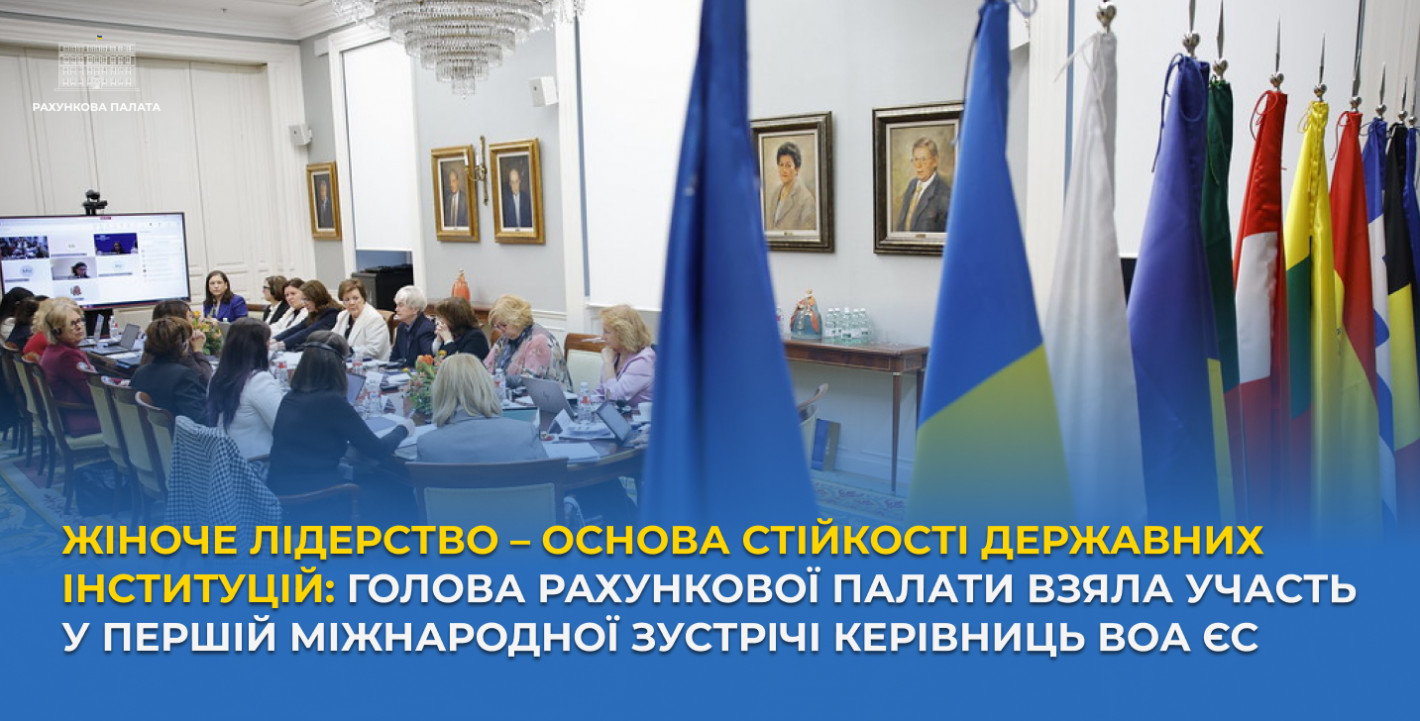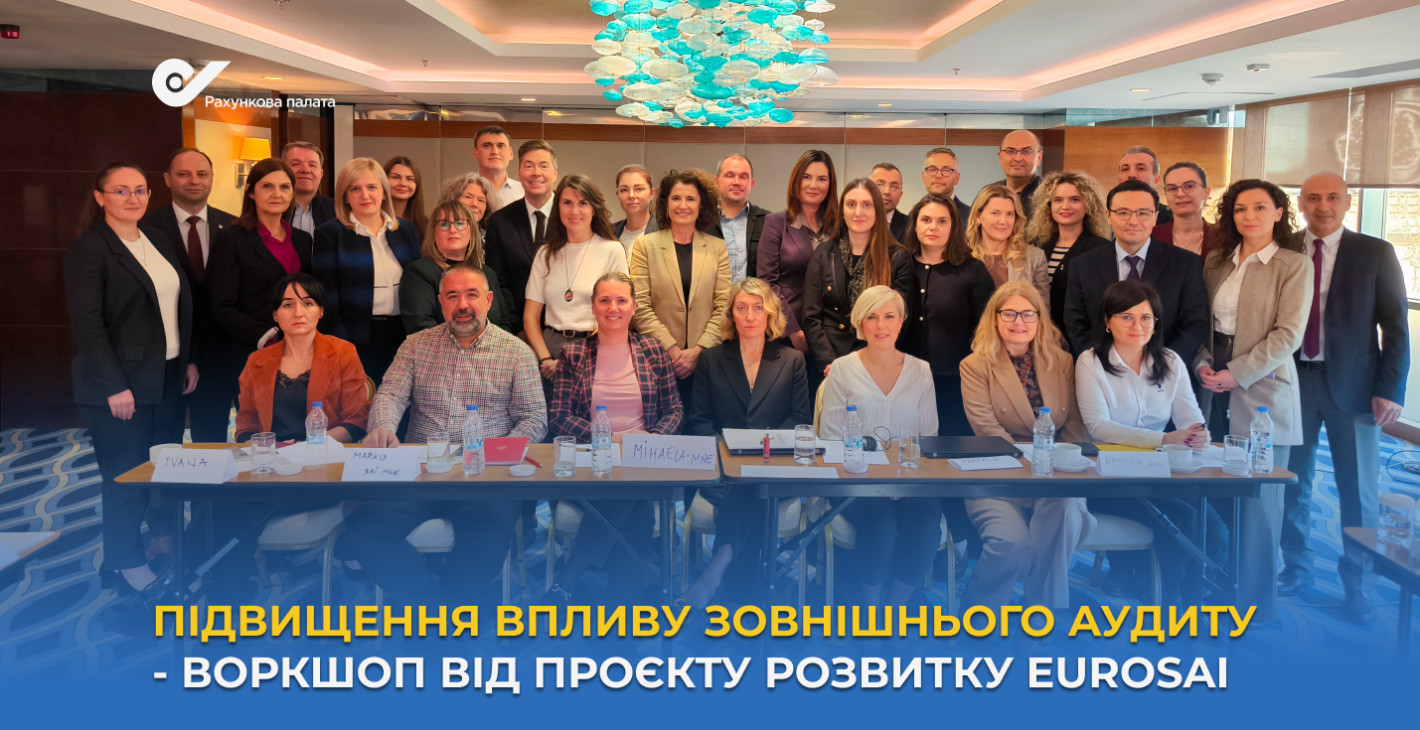The IXth Meeting of the EUROSAI Working Group on the Audit of Funds Allocated to Disasters and Catastrophes was held under the chairmanship of the Accounting Chamber of Ukraine. The meeting was held offline for the first time since 2019. 43 participants from 11 countries (Bulgaria, Estonia, Georgia, Hungary, Latvia, Moldova, Poland, Romania, Serbia, Turkey and Ukraine).
During the opening of the meeting, Viktor Bohun, Member of the Accounting Chamber, noted that although the Working Group began its journey with issues related to the use of funds allocated for the liquidation of the consequences of the Chernobyl disaster (including international aid), the present requires a response to new challenges, one of which is Russia’s war in Ukraine.
“The aggression of the Russian Federation in Ukraine led to numerous bitter consequences: a large number of military and civilian casualties, a humanitarian crisis with massive displacement of the population, destruction of infrastructure, damage to the surrounding natural environment, especially after the occupiers blew up the Kakhovska HPP” – Viktor Bohun said and emphasized that Ukraine and the world may face a larger-scale catastrophe. After all, there is still a possible threat of an accident caused by the actions of the Russian occupiers at the Zaporizhzhia nuclear power plant. This terrorist attack will have consequences for approximately 1 billion people and 40 countries.
“Working together and sharing information between countries can help reduce risks and prepare us for possible crisis situations. Therefore, the Working Group has started the development of guidelines for the audit of the assessment of damages caused by international armed conflicts/armed aggressions, as well as practical recommendations for conducting audits of the assessment of probable damages and minimizing the negative consequences of disasters”, – the chairman of the meeting said.
According to the Member of the Accounting Chamber, for the implementation of the Strategic Plan, the Group establishes cooperation with the Working Group on Disaster Management Auditing in the Framework of the Sustainable Development Goals (GTFD), which functions within the Organization of Latin American and Caribbean Supreme Audit Institutions (OLACEFS).
In addition, the Working Group began preparation of a joint document on research on the assessment of the effectiveness of national policies aimed at protecting forests from fires, as well as on improving the effectiveness of their activities.
Viktor Bohun emphasized that one of the important tasks for supreme audit institutions is the introduction of monitoring of government actions aimed at preventing various types of disasters.
“We do not know where and when disaster will come, but we must be as prepared as possible for it. It was the Working Group that agreed to conduct in 2024 a coordinated audit of the preparedness of governments to prevent disasters and eliminate their consequences. Its purpose is to assess the effectiveness of national systems for ensuring the safety of the population, the environment, objects and structures, and avoiding or reducing the risks of possible disasters in the countries of the SAIs, which are participants in the international audit, as well as providing joint recommendations to governments on improving the efficiency of their activities. This audit will contribute to the protection of the population and territories from various types of disasters in peacetime and in a special period, to ensure the readiness of forces and means to prevent and respond to disasters”, he summarized.
Mihai Busuioc, the President of the Romanian Court of Accounts, noted that the Working Group headed by the Accounting Chamber of Ukraine is considering one of the fundamental topics for any state of the European Union – the ability to prepare and reduce the impact of natural or man-made disasters on society with the help of an audit. He expressed his admiration for the Supreme Audit Institution of Ukraine, which fulfills its duty in difficult wartime. In addition, Mihai Busuioc expressed support for the Ukrainian people and emphasized Romania’s readiness to continue helping Ukraine not only in accepting refugees, ensuring the transit of exported grain, military aid, but also international diplomatic support until the end of the war.
During the meeting, the SAI of Romania shared the country’s experience in emergency management and presented a summary of the flood performance audit report. The Accounting Chamber of Ukraine presented the reports on “Governments’ preparedness for disasters. Why is it important?”, “Disasters caused by the war in Ukraine – the role of the Accounting Chamber of Ukraine” and shared audit approaches to planning and conducting disaster audits. The SAI of Latvia reported on the planning and readiness of the national civil protection system, the SAI of Poland presented a summary on countering COVID-19. The US GAO has prepared a report on its activities in the field of disaster preparedness and recovery. The SAI of Georgia presented an audit report on the management (prevention, preparedness) of emergency situations caused by forest fires. The SAI of Hungary – Fire prevention tasks of Hungarian disaster management.
Reference:
The EUROSAI Working Group on the Audit of Funds Allocated to Disasters and Catastrophes was established in 2014 by the resolution of the IX EUROSAI Congress. Throughout the period, the Group is chaired by the Accounting Chamber of Ukraine.
At the beginning of 2022, the Working Group consisted of 20 supreme audit institutions. However, in March 2022, the Governing Board of EUROSAI, at the proposal of the Accounting Chamber, suspended the membership of 2 SAIs – of Belarus and Russia.







